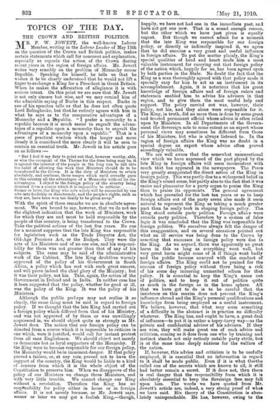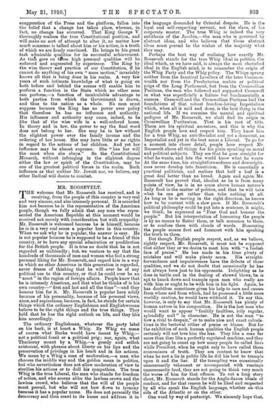TOPICS OF THE DAY.
THE CROWN AND BRITISH POLITICS.
MR. F. W. JOWETT, the well-known Labour Member, writing in the Labour Leader of May 13th on the question of the Crown and British politics, makes certain statements which call for comment and explanation, especially as regards the action of the Crown during recent years in the region of foreign affairs. Mr. Jowett writes very sensibly on the problem of Monarchy versus Republic. Speaking for himself, he tells us that he wishes it to be clearly understood that he would not lift a finger to exchange a King for a President in Great Britain. When he makes the affirmation of allegiance it is with serious intent. On this point we are sure that Mr. Jowett is not only sincere but wise, and we may remind him of the admirable saying of Burke in this respect. Burke in one of his speeches tells us that he does not often quote Lord Bolingbroke, but that he entirely agrees with him in what he says as to the comparative advantages of a Monarchy and a Republic. " I prefer a monarchy to a republic because it is much easier to engraft the advan- tages of a republic upon a. monarchy than to engraft the advantages of a monarchy upon a republic." That is a piece of practical wisdom which the longer and more closely it is considered the more clearly it will be seen to contain an essential truth. Mr. Jowett in his article goes on as follows :— " But I feel it my duty to point out that, however worthy, able, or wise the occupant of the Throne for the time being may be, it is against the interest of the people in the long run to fall into the habit of allowing the work that Ministers should do to be transferred to the Crown. It is the duty of Ministers to retain absolutely, and continue, those usages which until recently gave to this country all the advantages of a Monarchy without its dis- advantages. I object to the foreign policy of the country being
directed from a source which it is impossible to criticise Sooner or later, the King who acts wisely will be succeeded by one who acts foolishly or disastrously, and the people's rights, such as they are, have been won too dearly to be given away?'
With the spirit of these remarks we are in absolute agree- ment. We are bound to say, however, that we do not see the slightest indication that the work of Ministers, work for which they are and must be held responsible by the people of this country, is being transferred to the Crown. Take the political actions of the last five years. No one for a moment supposes that the late King was responsible for legislation such as the Trade Disputes Act, the Old-Age Pensions Act, or the Budget. They were the acts of his Ministers and of no one else, and his responsi- bility for them was not greater than that of any of his subjects. The same may be said of the administrative work of the Cabinet. The late King doubtless warmly approved of the policy of his Government in South Africa, a policy which has met with such great success, and will prove indeed the chief glory of the Ministry ; but it was their policy, not his. Take, again, the action of the Government in Ireland and in India. In neither case has it been suggested that the policy, whether for good or ill, was the policy of the King. It was the policy of his Ministers.
Although the public perhaps may not realise it so clearly, the same thing must be said in regard to foreign policy. If we thought that the late King had carried out a foreign policy which differed from that of his Ministry, and was not approved of by them or was unwillingly acquiesced in, we should object quite as strongly as Mr. Jowett does. The notion that our foreign policy can be directed from a source which it is impossible to criticise is one which, were it justified, would call for instant protest from all sane Englishmen. We should object not merely as democrats but as loyal supporters of the Monarchy. If the King were to become responsible for our foreign policy, the Monarchy would be in imminent danger. If that policy proved a failure, or, at any rate, proved not to have the support of the country, the King would be liable to a kind of censure from which it is the whole object of the Constitution to preserve him. When we disapprove of the policy of our Ministers we change those Ministers, and with very little trouble. We cannot change our King without a revolution. Therefore the King has no responsibility for policy either in home or in foreign affairs. It is not merely because, as Mr. Jowett says, sooner or later we may get a foolish King,—though, happily, we have not had one in the immediate past, and have not got one now. That is a sound enough reason, but the other which we have just given is equally cogent. But though we cannot admit for a moment that the late King was responsible for our foreign policy, or directly or indirectly inspired it, we agree that he did exercise a very great and useful influence in foreign affairs. To put the matter plainly, the King's special qualities of head and heart made him a most valuable instrument for carrying out that foreign policy of the nation which, happily for us, has been agreed upon by both parties in the State. No doubt the fact that the King as a man thoroughly agreed with that policy made it specially easy for him to act as an instrument in its accomplishment. Again, it is notorious that his great knowledge of foreign affairs and of foreign rulers and statesmen enabled him to advise his advisers in that region, and to give them the most useful help and support. The policy carried out was, however, their policy, not his, and they alone were responsible for it. The Ring, in truth, did no more than is done by some great and trusted permanent official -whose advice is often relied upon by Ministers. In all Departments of the Govern. ment the Sovereign acts to some extent as an expert whose personal views may sometimes be different from those of his Ministers, but who is always listened to. In the region of foreign affairs the King was no doubt in a special degree an expert whose advice often proved exceedingly valuable. We are well aware that the somewhat unsensational view which we have expressed of the part played by the late King in foreign affairs will seem inconsistent with much that has appeared in the newspapers. The Press very greatly exaggerated the direct action of the King in foreign policy. This was partly due to a widespread belief in the King's sound sense, but partly also to the fact that it was easier and pleasanter for a. party organ to praise the King than to praise its opponents. The general agreement which has prevailed for the last ten years or so to keep foreign affairs out of the party arena also made it seem natural to represent the King as taking a much greater part than he really took in shaping foreign policy. The King stood outside party politics. Foreign affairs were outside party politics. Therefore by a system of false logic it was concluded that the King was responsible for foreign politics. We ourselves always felt the danger of this exaggeration, and on several occasions pointed out what an ill service was being done to the Crown by asserting that successes in foreign policy were due to the King. As we argued, there was apparently no great harm in this as long as everything went well, but very great harm might come of it if things went badly and the public became annoyed with the conduct of foreign affairs. The King could not be praised for the success of foreign policy without there being a risk of his some day incurring unmerited odium for that policy. It is essential to keep the King's name out of politics, and to keep it out of politics quite as much in the foreign as in the home sphere. All that we have got to do is to be careful that the insistence on this maxim does not prevent the King's influence abroad and the King's personal qualifications and knowledge from being employed as a useful instrument, We believe, however, that what may seem something of a difficulty in the abstract is in practice no difficulty whatever. The King has, and ought to have, a great deal of influence—to put it in rather a topsy-turvy way—as the private and confidential adviser of his advisers. If they are wise, they will make great use of such advice and criticism, coming as it does from one who by training and instinct stands not only entirely outside party strife, but is at the same time deeply anxious for the welfare of the nation.
If, however, this advice and criticism is to be usefully employed, it is essential that no information in regard to it shall be made public. Even if it is what Goethe called one of the secrets which are known to all, it still had better remain a secret. If it does not, then there is real danger that the responsibility from which it is absolutely essential to keep the Sovereign free may fall upon him. The words we have quoted from Mr. Jowett's article are, indeed, a very strong proof of what we have said. His theory of the Constitution is abso- lutely unimpeachable. He has, however, owing to the exaggeration of the Press and the platform, fallen into the belief that a change has taken place, whereas, in fact, no change has occurred. That King George V. thoroughly realises the true Constitutional position, and will make no sort of attempt to alter it, no matter how much nonsense is talked about him or his action, is a truth of which we are firmly convinced. He brings to his great task admirable qualities for its successful achievement. As times goes on ti bse high personal qualities will be enforced and augmented by experience. The King by the wise theory and practice of our Constitution, if he cannot do anything of his own " mere motion," invariably knows all that is being done in his realm. A very few years of such intimate knowledge of what is going on both before and behind the scenes will enable him to perform a function in the State which no other man can perform,—a function of incalculable advantage to both parties from which the Government is drawn, and thus to the nation as a whole. No man must suppose because the King has no power over policy that therefore he has no influence and authority. His influence and authority may come, indeed, to be like that of the wise wife in a well-ordered home. In theory and in law, the power to say the final word does not belong to her. She may be in law without the slightest power over the family income and the ordering of her house. She may have little or no rights in regard to the actions of her children. And yet her influence may be almost supreme. She " has her will the most when she obeys." So the Constitutional Monarch, without infringing in the slightest degree either the law or spirit of the Constitution, may be one of the greatest political forces in the realm. Such influence as that neither Mr. Jowett nor, we believe, any other Radical will desire to combat.







































 Previous page
Previous page